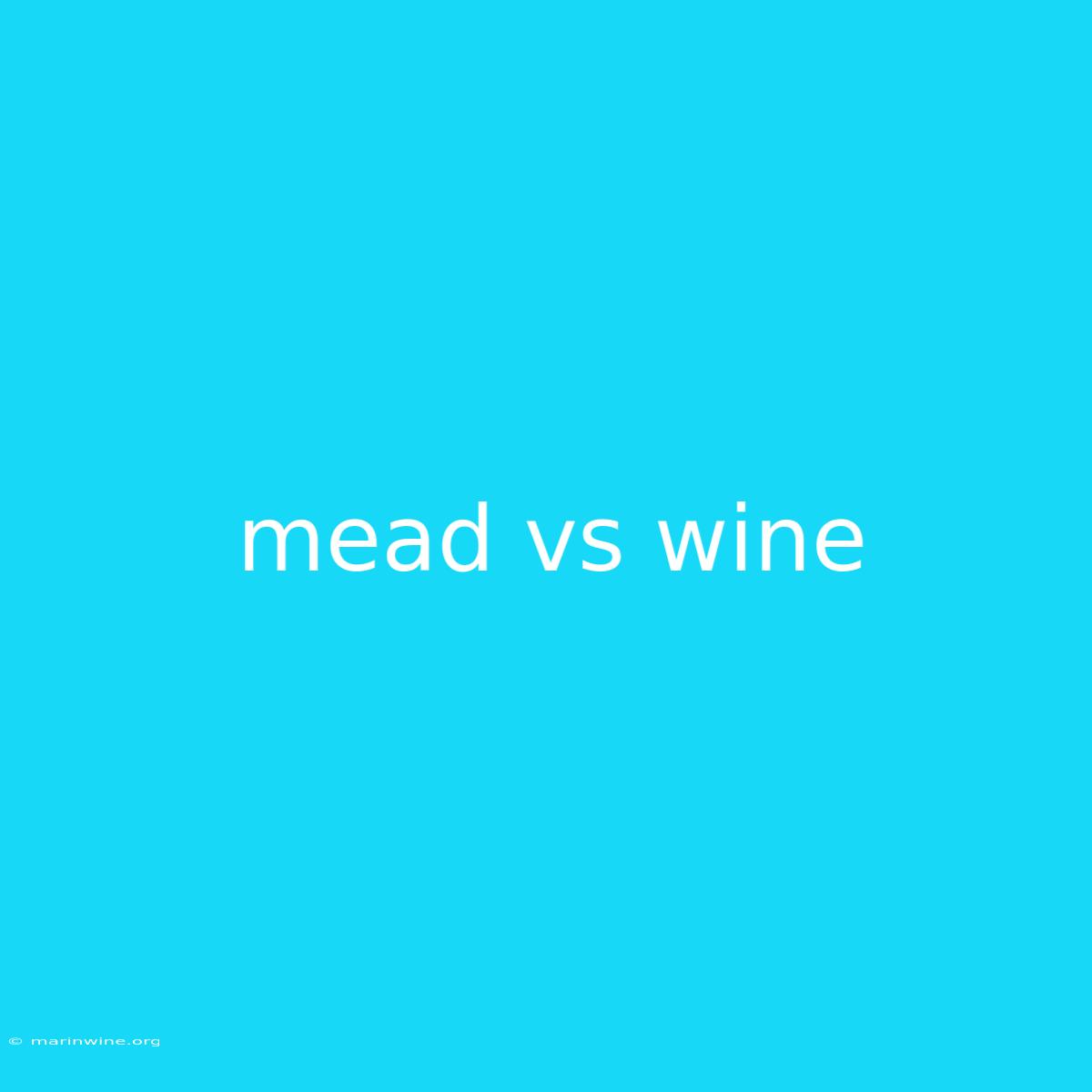Mead vs. Wine: Uncorking the Secrets of Ancient Beverages
Have you ever wondered about the difference between mead and wine? While both are alcoholic beverages enjoyed for centuries, they hold distinct characteristics. This exploration delves into the fascinating world of these ancient drinks, unveiling their unique qualities and highlighting why they remain popular today.
Why It Matters: Understanding the differences between mead and wine offers a broader perspective on the diverse world of alcoholic beverages. It helps appreciate the history, production processes, and flavor profiles of these cherished drinks.
Key Takeaways of Mead vs. Wine:
| Feature | Mead | Wine |
|---|---|---|
| Base | Honey | Grapes |
| Yeast | Various yeast strains, including wild yeasts | Primarily Saccharomyces cerevisiae, occasionally other strains |
| Sugar | Honey's natural sugars | Grapes' natural sugars, sometimes additional sugars for sweetness |
| Alcohol | 5% - 20% ABV, depending on honey concentration and fermentation | 8% - 15% ABV, variations based on grape variety and fermentation process |
| Flavor Profile | Sweet to dry, floral, fruity, spicy, earthy | Dry to sweet, fruity, floral, earthy, herbaceous, depending on grape type |
Mead: The Honeyed Elixir
Introduction
Mead, often referred to as "honey wine," is the oldest known alcoholic beverage, dating back to ancient civilizations. Its production relies on fermenting honey with water, yeast, and occasionally spices or fruit.
Key Aspects of Mead:
- Honey Variety: The type of honey used significantly impacts the flavor profile, with buckwheat honey creating a darker mead and wildflower honey contributing a floral aroma.
- Yeast Selection: Choosing the right yeast strain influences the fermentation process and the resulting mead's character.
- Aging: Mead often benefits from aging in oak barrels, acquiring complex flavors and aromas.
- Styles: Mead encompasses various styles, from dry meads with low sweetness to sweet meads with a honeyed taste.
Exploring Honey's Influence:
Honey is not just a sweetener in mead; it contributes a distinct complexity and depth of flavor. The inherent sweetness of honey, combined with its diverse floral and botanical notes, creates a unique beverage.
Wine: The Fruit of the Vine
Introduction
Wine, produced from fermented grape juice, enjoys a long and illustrious history. Its versatility in flavors and styles is a testament to the grape's adaptability and the art of winemaking.
Key Aspects of Wine:
- Grape Variety: The grape varietal is paramount in winemaking, determining the wine's flavor profile and characteristics.
- Terroir: The vineyard's soil, climate, and geographic location significantly influence the grape's growth and the resulting wine.
- Winemaking Techniques: From the choice of yeast to the duration of fermentation and the use of oak barrels, numerous factors contribute to the final wine's style.
- Styles: Wine encompasses a wide range of styles, from light and refreshing whites to robust and complex reds.
Exploring the Grape's Impact:
The grape is the heart of winemaking, contributing its intrinsic flavor, aroma, and tannins. The terroir where the grapes are grown also influences the wine's character, adding an element of place and origin.
Mead vs. Wine: A Comparative Table
| Feature | Mead | Wine |
|---|---|---|
| Production | Fermentation of honey with water and yeast | Fermentation of grape juice with yeast |
| Sweetness | Varies, from dry to sweet | Varies, from dry to sweet |
| Alcohol Content | 5% - 20% ABV | 8% - 15% ABV |
| Flavor Profile | Floral, fruity, spicy, earthy | Fruity, floral, earthy, herbaceous |
| Typical Serving | Room temperature | Chilled or room temperature, depending on style |
| Pairing | Cheeses, desserts, spicy dishes | Various food pairings, from appetizers to desserts |
FAQ for Mead vs. Wine:
Q: Is mead sweeter than wine? A: Not necessarily. Both mead and wine can range from dry to sweet, depending on the style and production process.
Q: Is mead more alcoholic than wine? A: Mead can have a higher alcohol content, typically ranging from 5% to 20% ABV, while wine usually sits between 8% and 15% ABV.
Q: Are mead and wine both considered "natural" beverages? A: Yes, both are considered "natural" beverages as they rely on natural ingredients – honey and grapes, respectively – and fermentation.
Q: Can mead and wine be aged? A: Yes, both mead and wine can be aged, often developing complex flavors and aromas over time.
Q: Are mead and wine gluten-free? A: Traditionally, both are considered gluten-free, as they do not contain gluten-containing grains. However, some producers may use additives or other ingredients that could introduce gluten.
Tips for Enjoying Mead and Wine:
- Taste before you buy: If possible, sample different meads and wines to find styles you enjoy.
- Pair intelligently: Explore pairing combinations that complement the flavor profiles of both beverages.
- Store properly: Store both mead and wine in cool, dark places to preserve their quality.
- Experiment: Be adventurous and try different varieties of both mead and wine to expand your palate.
Summary by Mead vs. Wine:
This exploration has unveiled the distinct characteristics of mead and wine, two ancient beverages that continue to captivate the world. While both rely on fermentation, their unique ingredients, production processes, and flavor profiles set them apart. Understanding their differences allows for a richer appreciation of the diverse world of alcoholic beverages and encourages exploration of their fascinating histories and cultural significance.
Closing Message: Next time you encounter mead or wine, consider their intriguing origins and the journey they have taken to arrive in your glass. Whether you prefer the honeyed sweetness of mead or the fruity complexity of wine, both offer a journey of taste and discovery.

